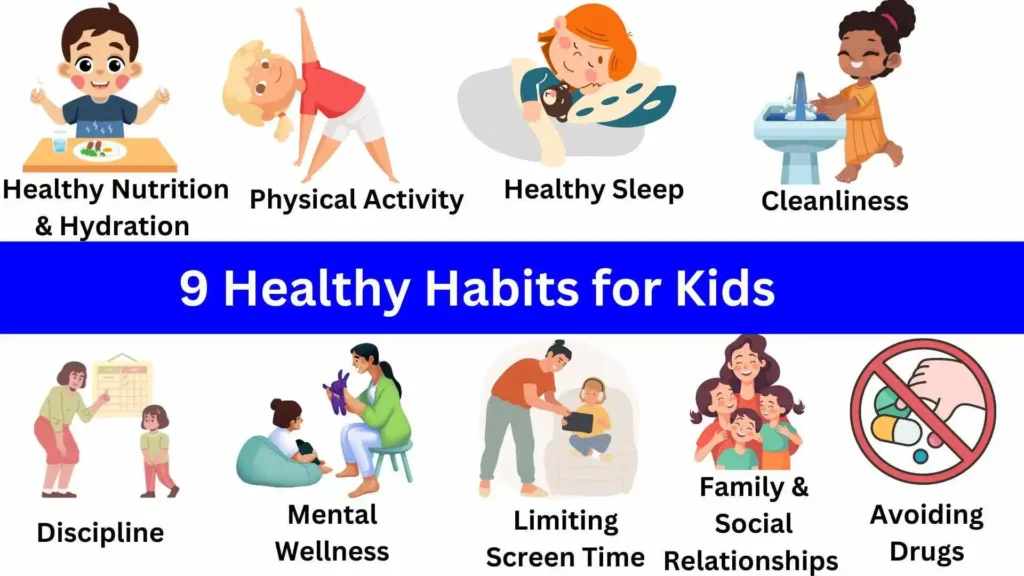Creating healthy habits for kids is essential for their physical, mental, and emotional well-being. These habits help children become healthy adults and lay the groundwork for a positive lifestyle.
Building healthy habits encompasses a range of activities and behaviors that promote overall health and well-being. Some examples of healthy habits for kids are regular exercise, limited screen time, healthy snacks, healthy eating, etc.
Table of Contents
10 Healthy Habits for Kids
Important healthy habits and tips for kids are discussed below.

1. Healthy Nutrition and Hydration Habits for Kids
Ensuring your children develop healthy nutrition and hydration habits is a cornerstone of their well-being. These habits are essential for their growth, cognitive development, and long-term health.
A balanced diet and adequate hydration are crucial for kids as they provide the necessary nutrients and fluids that support physical and mental development. Developing these habits early on ensures that children grow up with a strong foundation for a healthy lifestyle.
There are some basic and practical tips to help you cultivate healthy habits for kids at home that focus on proper nutrition and hydration.
I. Balanced Diet
Ensure your child eats a balanced diet that includes a variety of foods from all the major food groups: fruits, vegetables, whole grains, proteins, and dairy. This provides essential nutrients that support growth and development.
II. Healthy Snacks
Offer healthy snacks like fruits, nuts, yogurt, and whole-grain crackers instead of sugary or processed foods. Healthy snacks help maintain energy levels and prevent overeating during meals. Healthy snack time is also one of the healthy habits activities for preschoolers.
III. Offer Water Regularly
Water is the best choice for keeping kids hydrated. Encourage your child to drink water throughout the day, especially after physical activity or in hot weather.
IV. Limit Sugary Drinks
Limit the consumption of sugary drinks like sodas and fruit juices, which can contribute to obesity and tooth decay. Opt for water, milk, or natural fruit juices in moderation.
2. Physical Activity: A Vital Healthy Habit for Kids
Regular exercise is a cornerstone of a healthy lifestyle for kids. Encouraging physical activity as a daily habit helps children develop strong muscles and bones, maintain a healthy weight, and improve cardiovascular health.
Here’s how to make physical activity a fun and integral part of your child’s life:
- Reducing screen time frees up more time for physical activities. Set limits on TV, computer, and mobile device usage to promote more active play.
- Be a role model by staying active yourself. Participate in family activities like hiking, playing tag, or going for walks together.
3. Healthy Sleep: Essential for Growing Kids
Adequate sleep is critical for children’s growth, learning, and overall health. Establishing healthy sleep habits ensures that kids get the rest they need to recharge and develop properly. The following tips can foster good sleep in kids.
I. Set a Consistent Bedtime Routine
Create a calming bedtime routine to help your child wind down. This could include reading a book, taking a warm bath, or listening to soft music
II. Teach Your Child
Educate your child about the importance of sleep. Explain how it helps them grow, improves their mood, and supports learning and concentration.
III. Limit Screen Time
Reduce exposure to screens at least an hour before bedtime. The blue light from screens can interfere with the production of melatonin, the sleep hormone.
4. Cleanliness: A Fundamental Healthy Habit for Kids
Maintaining cleanliness is crucial for preventing illnesses and promoting the overall health of kids. Teaching your child good hygiene practices, including proper food handling, washing hands, and keeping their clothes clean, is essential. You can instill these habits in your kids as:
I. Hand Washing
Teach your child to wash their hands regularly, especially before eating and after using the bathroom. Guide them to use soap and water, and scrub their hand for at least 20 seconds.
II. Healthy Snacks
Ensure that the food your child eats is prepared and stored hygienically. Teach them the importance of washing fruits and vegetables before eating.
III. Clothing Cleanliness
Encourage your child to change clothes regularly and ensure their clothes are washed properly. This helps prevent skin infections and promotes overall hygiene. Teach your child to keep their surroundings clean. This includes tidying up their room, cleaning their toys, and helping with household chores.
5. Discipline: A Foundation for Healthy Habits
Discipline is a fundamental habit that sets the stage for other healthy behaviors. Teaching your child self-discipline helps them develop a sense of responsibility, self-control, and the ability to make positive choices.
Educate your child on the importance of discipline in achieving goals and maintaining healthy habits. Help them understand how discipline leads to success in school, sports, and other areas of life.
With the following tips you can foster discipline in your children:
- Establish clear rules and expectations for behavior. Consistency is the key; ensure that rules are consistently enforced and understood by your children.
- Positive reinforcement can go a long way in encouraging disciplined behavior. Praise your children for following rules and meeting expectations.
- Maintain a positive and supportive attitude. Use discipline as a teaching tool rather than a punishment. Explain the reasons behind rules and the benefits of following them.
6. Mental Wellness: Nurturing a Healthy Mind
A healthy mind is essential for overall well-being. Promoting mental wellness in children is one of the healthy habits for kids and helps them develop resilience, emotional intelligence, and a positive outlook on life.
Here are some tips to nurture a healthy mind in kids:
- Create a safe space for your children to express their thoughts and feelings. Encourage them to talk about their day, their worries, and their achievements.
- Model positive thinking and coping strategies. Show your children how to handle stress and setbacks healthily.
- Reducing screen time can improve mental health. Encourage activities that engage the mind and body, such as sports, hobbies, and family outings.
7. Limiting Screen Time: A Crucial Healthy Habit for Kids
In today’s digital age, managing screen time is more important than ever. Limiting excessive screen time can prevent various health issues, including poor posture, eye strain, and disrupted sleep in your kids.
Use the following tips to ensure your child benefits from a balanced approach to screen usage:
I. Set Clear Limits
Establish and enforce daily screen time limits. Encourage alternative activities like reading, outdoor play, and hobbies to keep your child engaged.
II. Create Screen-Free Zones
Designate certain areas of the home, such as the dining room and bedrooms, as screen-free zones. This helps reduce screen dependency and promotes healthier habits.
III. Encourage Physical Activity
Substitute some screen time with physical activities. Whether it’s playing sports, biking, or simply running around in the yard, physical activity is essential for overall health.
IV. Monitor Content
Be aware of what your child is watching and playing. Choose educational and age-appropriate content that supports their development.
8. Family and Social Relationships for Kids
Healthy family and social relationships are fundamental for a child’s emotional and social development. These relationships provide a support network that helps children feel secure and loved. With the following ways you can cultivate these connections:
I. Spend Quality Time Together
Make time for family activities such as meals, games, and outings. Quality time strengthens family bonds and creates lasting memories. The presence of parents and other family members is crucial for a child to learn valuable things.
II. Encourage Social Interaction
Encourage your child to build friendships through playdates, group activities, and community events. Social interactions help develop communication skills and empathy. It makes the child multidimensional and able to make decisions on time.
III. Model Positive Relationships
Demonstrate healthy relationships through your interactions with family and friends. Children learn a lot by observing how adults manage relationships.
IV. Teach Communication Skills
Help your child develop effective communication skills. Encourage open discussions about their feelings and experiences, and teach them how to listen and respond respectfully.
9. Avoiding Drugs: Promoting a Healthy Lifestyle
Teaching children the dangers of drugs and fostering a drug-free lifestyle is crucial for their long-term health and well-being. You can guide your child towards making healthy choices as:
- Educate Early:Start conversations about the risks of drug use early. Use age-appropriate language to explain the harmful effects of drugs on health and well-being.
- Promote Healthy Alternatives:Encourage your child to engage in healthy activities that bring joy and satisfaction. Sports, hobbies, and creative pursuits can provide natural highs and a sense of accomplishment.
- Create a Supportive Environment: Foster a supportive and open home environment where your child feels comfortable discussing their concerns and peer pressures.
- Be a Role Model: Model healthy behaviors and make drug-free choices in your own life. Your actions speak louder than words and can have a significant impact on your child’s decisions.
How can Kids Practice Good Habits at Home?
Practicing healthy habits at home is crucial for Kids’ development, well-being, and self-confidence. Teaching healthy habits to kids lays a strong foundation for their future and promotes physical, emotional, and mental health.
With the following guide, kids can effectively practice healthy habits at home.
1. Lead by Example
Mostly kids learn from their parents and peers. Demonstrating healthy habits for kids in your behavior sets a powerful example for them to follow.
- Healthy Eating: Show your kids how to make nutritious food choices by adding a variety of fruits, vegetables, and whole grains into your meals.
- Physical Activity: Engage in regular exercise and invite your children to join you. Activities like family walks, bike rides, or playing sports together promote an active lifestyle.
- Positive Attitude: Display a positive outlook on life. Handle stress and challenges calmly and show your children how to stay optimistic.
2. Create a Routine
Establishing a consistent daily routine helps children understand the importance of good habits. A structured schedule can include set times for meals, homework, play, and bedtime.
- Consistency: Stick to the routine as much as possible. kids feel secure when they are consistent.
- Balance: Ensure the routine includes a balance of activities, from schoolwork to leisure, to promote overall well-being
3. Make Learning Fun
Incorporate fun activities for kids to practice healthy habits at home. Children are more likely to adopt good habits when learning is engaging and enjoyable.
- Games and Activities: Use games, songs, and stories to teach habits like brushing teeth, washing hands, and eating healthily.
- Interactive Learning: Engage your children in cooking healthy meals or planting a garden. These hands-on activities make learning about nutrition and the environment more enjoyable.
4. Positive Reinforcement
Reinforcing good behavior with positive feedback encourages children to continue practicing healthy habits.
- Praise and Rewards: Acknowledge and praise your children when they follow good habits. Use rewards like stickers or extra playtime to motivate them.
- Encouragement: Offer encouragement and support, especially when children are trying to adopt new habits. Celebrate their efforts and progress.
5. Teach Responsibility
A sense of responsibility helps kids understand the importance of maintaining healthy habits. Assign age-appropriate chores that promote cleanliness and organization. Tasks like tidying their room, setting the table, and helping with laundry teach responsibility.
Conclusion
Incorporating healthy habits for kids into their daily routine sets the stage for a lifetime of good health. By encouraging regular exercise, limiting screen time, providing healthy snacks, promoting a balanced diet, staying positive, and educating your child, you can help them develop habits that will benefit them for years to come. Remember, the key is to make these activities enjoyable and part of their everyday life.




